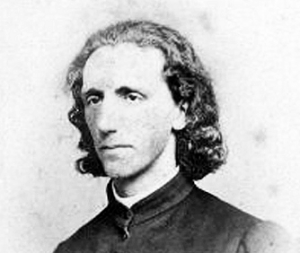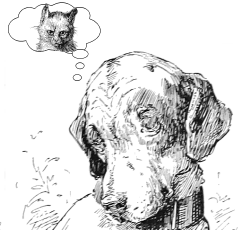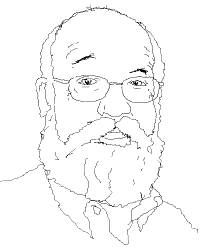 Why does the question of determinism versus free will continue to trouble us? There’s nothing too strange, perhaps, about a philosophical problem remaining in play for a while – or even for a few hundred years: but why does this one have such legs and still provoke such strong and contrary feelings on either side?
Why does the question of determinism versus free will continue to trouble us? There’s nothing too strange, perhaps, about a philosophical problem remaining in play for a while – or even for a few hundred years: but why does this one have such legs and still provoke such strong and contrary feelings on either side?
For me the problem itself is solved – and the right solution, broadly speaking, has been known for centuries: determinism is true, but we also have free choice in a meaningful sense. St Augustine, to go no earlier, understood that free will and predestination are not contradictory, but people still find it confusing that he spoke up for both.
If this view – compatibilism – is right, why hasn’t it triumphed? I’m coming to think that the strongest opposition on the question might not in fact be between the hard-line determinists and the uncompromising libertarians but rather a matter of both ends against the middle. Compatibilists like me are happy to see the problem solved and determinism reconciled with common sense, whereas people from both the extremes insist that that misses something crucial. They believe the ‘loss’ of free will radically undercuts and changes our traditional sense of what we are as human beings. They think determinism, for better or worse, wipes away some sacred mark from our brows. Why do they think that?
Let’s start by quickly solving the old problem. Part one: determinism is true. It looks, with some small reservations about the interpretation of some esoteric matters, as if the laws of physics completely determine what happens. Actually even if contemporary physics did not seem to offer the theoretical possibility of full determination, we should be inclined to think that some set of rules did. A completely random or indeterminate world would seem scarcely distinguishable from a nullity; nothing definite could be said about it and no reliable predictions could be made because everything could be otherwise. That kind of scenario, of disastrous universal incoherence is extreme, and I admit I know of no absolute reason to rule out a more limited, demarcated indeterminacy. Still, the idea of delimited patches of randomness seems odd, inelegant and possibly problematic. God, said Einstein, does not play dice.
Beyond that, moreover, there’s a different kind of point. We came into this business in pursuit of truth and knowledge, so it’s fair to say that if there seemed to be patches of uncertainty we should want to do our level best to clarify them out of existence. In this sense it’s legitimate to regard determinism not just as a neutral belief, but as a proper aspiration. Even if we believe in free will, aren’t we going to want a theory that explains how it works, and isn’t that in the end going to give us rules that determine the process? Alright, I’m coming to the conclusion too soon: but in this light I see determinism as a thing that lovers of truth must strive towards (even if in vain) and we can note in passing that that might be some part of the reason why people champion it with zeal.
We’re not done with the defence, anyway. One more thing we can do against indeterminacy is to invoke the deep old principle which holds that nothing comes of nothing, and that nothing therefore happens unless it must; if something particular must happen, then the compulsion is surely encapsulated in some laws of nature.
Further still, even if none of that were reliable, we could fall back on a fatalistic argument. If it is true that on Tuesday you’ll turn right, then it was true on Monday that you would turn right on Tuesday; so your turning that way rather than left was already determined.
Finally, we must always remember that failure to establish determinism is not success in establishing liberty. Determinism looks to be true; we should try to establish its truth if by any means we can: but even if we fail, that failure in itself leaves us not with free will but with an abhorrent void of the unknowable.
Part two: we do actually make free decisions. Determinism is true, but it bites firmly only at a low level of description; not truly above the level of particles and forces. To look for decisions or choices at that level is simply a mistake, of the same general kind as looking for bicycles down there. Their absence from the micro level does not mean that cyclists are systematically deluded. Decisions are processes of large neural structures, and I suggest that when we describe them as free we simply mean the result was not constrained externally. If I had a gun to my head or my hands were tied, then turning left was not a free decision. If no-one could tell which way I should go without knowledge of what was going on in the large neural structures that realise my mind, then it was free. There are of course degrees of freedom and plenty of grey areas, but the essential idea is clear enough. Freedom is just the absence of external constraint on a level of description where people and decisions are salient, useful concepts.
For me, and I suppose other compatibilists, that’s a satisfying solution and matches well with what I think I’ve always meant when I talk about freedom. Indeed, it’s hard for me to see what else freedom could mean. What if God did play dice after all? Libertarians don’t want their free decisions to be random, they want them to belong to them personally and reflect consideration of the circumstances; the problem is that it’s challenging for them to explain in that case how the decisions can escape some kind of determination. What unites the libertarians and the determinists is the conviction that it’s that inexplicable, paradoxical factor we are concerned to affirm or deny, and that its presence or absence says something important about human nature. To quietly do without the magic, as compatibilists do, is on their view to shoot the fox and spoil the hunt. What are they both so worried about?
I speculate that the one factor here is a persistent background confusion. Determinism, we should remember, is an intellectual achievement, both historically and often personally. We live in a world where nothing much about human beings is certainly determined; only careful reflection reveals that in the end, at the lowest level of detail and at the very last knockings of things, there must be certainty. This must remain a theoretical conclusion, certainly so far as human beings are concerned; our behaviour may be determinate, but it is not determinable; certainly not in practice and very probably not even in theory, given the vast complexity, chaotic organisation and marvellously emergent properties of our brains. Some of those who deny determinism may be moved, not so much by explicit rejection of the true last-ditch thesis, but by the certainty that our minds are not determinable by us or by anyone. This muddying of the waters is perpetuated even now by arguments about how our minds may be strongly influenced by high-level factors: peer pressure, subliminal advertising, what we were given to read just before making a decision. These arguments may be presented in favour of determinism together with the water-tight last-ditch case, but they are quite different, and the high-level determinism they support is not certainly true but rather an eminently deniable hypothesis. In the end our behaviour is determined, but can we be programmed like robots by higher level influences? Maybe in some cases – generally, probably not.
The second, related factor is a certain convert enthusiasm. If determinism is a personal intellectual achievement it may well be that we become personally invested in it. When we come to appreciate its truth for the first time it may seem that we have grasped a new perspective and moved out of the confused herd to join the scientifically enlightened. I certainly felt this on my first acquaintance with the idea; I remember haranguing a friend about the truth of determinism in a way that must, with hindsight, have resembled religious conviction and been very tiresome.
“Yes, yes, OK, I get it,” he would say in a vain attempt to stop the flow.
Now no-one lives pure determinism; we all go behaving as if agency and freedom were meaningful. The fact that this involves an unresolved tension between your philosophy and the ideas about people you actually live by was not a deterrent to me then, however; in fact it may even have added a glamorous sheen of esoteric heterodoxy to the whole thing. I expect other enthusiasts may feel the same today. The gradual revelation, some years later, that determinism is true but actually not at all as important as you thought is less exciting: it has rather a dying fall to it and may be more difficult to assimilate. Consistency with common sense is perhaps a game for the middle aged.
“You know, I’ve been sort of nuancing my thinking about determinism lately…”
“Oh, what, Peter? You made me live through the conversion experience with you – now I have to work through your apostasy, too?”
On the libertarian side, it must be admitted that our power of decision really does look sort of strange, with a power far exceeding that of mere absence of constraint. There are at least two reasons for this. One is our ability to use intentionality to think about anything whatever, and base our decisions on those thoughts. I can think about things that are remote, non-existent, or even absurd, without any difficulty. Most notably, when I make decisions I am typically thinking about future events: will I turn left or right tomorrow? How can future events influence my behaviour now?
It’s a bit like the time machine case where I take the text of Hamlet back in time and give it to Shakespeare – who never actually produced it but now copies it down and has it performed. Who actually wrote it, in these circumstances? No-one, it just appeared at some point. Our ability to think about the future, and so use future goals as causes of actions now, seems in the same way to bring our decisions into being out of nowhere inside us. There was no prior cause, only later ones, so it really seems as if the process inverts and disrupts the usual order of causality.
We know this is indeed remarkable but it isn’t really magic. On my view it’s simply that our recognition of various entities that extend over time allows a kind of extrapolation. The actual causal processes, down at that lowest level, tick away in the right order, but our pattern-matching capacity provides processes at a higher level which can legitimately be said to address the future without actually being caused by it. Still, the appearance is powerful, and we may be impatient with the kind of materialist who prefers to live in a world with low ceilings, insists on everything being material and denies any independent validity to higher levels of description. Some who think that way even have difficulty accepting that we can think directly about mathematical abstractions – quite a difficult posture for anyone who accepts the physics that draws heavily on them.
The other thing is the apparent, direct reality of our decisions. We just know we exercise free will, because we experience the process immediately. We can feel ourselves deciding. We could be wrong about all sorts of things in the world, but how could I be wrong about what I think? I believe the feeling of something ineffable here comes from the fact that we are not used to dealing with reality. Most of what we know about the world is a matter of conscious or unconscious inference, and when we start thinking scientifically or philosophically it is heavily informed by theory. For many people it starts to look as if theory is the ultimate bedrock of things, rather than the thin layer of explanation we place on top. For such a mindset the direct experience of one’s own real thoughts looks spooky; its particularity, its haecceity, cannot be accounted for by theory and so looks anomalous. There are deep issues here, but really we ought not to be foxed by simple reality.
That’s it, I think, in brief at least. More could be said of course; more will be said. The issues above are like optical illusions: just knowing how they work doesn’t make them go away, and so minds will go on boggling. People will go on furiously debating free will: that much is both determined and determinable.


 The older I get, the less impressed I am by the hardy perennial of free will versus determinism. It seems to me now like one of those completely specious arguments that the Sophists supposedly used to dumbfound their dimmer clients.
The older I get, the less impressed I am by the hardy perennial of free will versus determinism. It seems to me now like one of those completely specious arguments that the Sophists supposedly used to dumbfound their dimmer clients. The unconscious is not just un. It works quite differently. So says Tim Crane in a persuasive draft
The unconscious is not just un. It works quite differently. So says Tim Crane in a persuasive draft 



